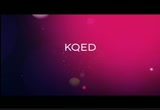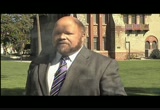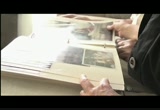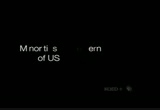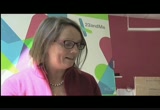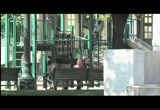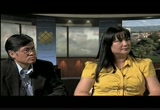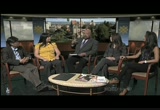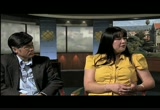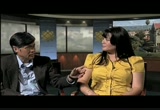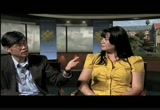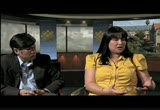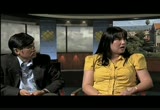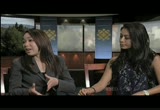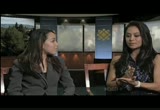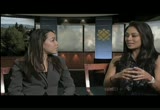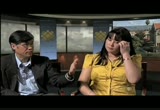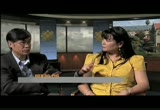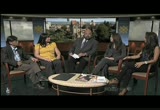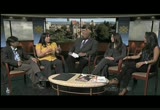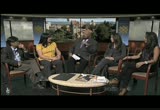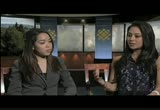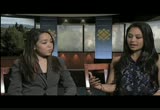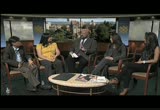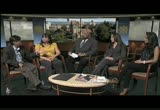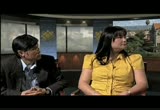tv Equal Time PBS September 29, 2012 2:00pm-2:30pm PDT
2:00 pm
new identity is emerging in the united states. how do the individuals fit into society? they don't belong to one group but multiple groups. >> one etc.kics verses the other ethnic. how do you balance it if you don't know the language? you thought of yourself as part of that ethnic group. >> how being biracial in america effects our cultural identity. that issue coming right up on equal time. >> from san jose state university you are watching equal time. exploring new issues each week.
2:01 pm
>> hello from the campus of san jose state university. welcome to this edition of equal time. i'm your host journalism school director bob rutger. the number of mixed race people have been increasing over the years. in san ho -- and san jose is one of the most dramatic examples. what is happening to cultural identity? jessica reports on the confusion of that identity. >> we get a sneak peek at roscoes light loop. >> but often answers a completely different kind of question from our audience. >> i get asked a lot who what ethnicity are you? >> she is half japanese and half italian and part of a new fast growing mixed population of the united states. >> as a public figure being in the media i feel zero pressure to be either a little asian or a little bit more white. >> she is caught up in the
2:02 pm
confusion over racial identity resulting from america stirring the melting pot to the boiling point. dr. jennifer is morrison says mixed race people are under pressure to choose their identity even though it's not so black and white. >> it's hard to tell who is of which race. we still want someone to choose which race. >> it's the human condition to know what an answer is. we want to know well okay this is right and this is wrong because i will find some insurance in that. >> she is keeping her real last name of italian origin but many media personalities that will remain nameless have chosen ethnic names to build mothers maiden name. >> we then struggle with do we want to be mixed race and only mixed? or do we want to showcase and highlight particular aspects of our identity that we can take advantage of in that moment? >> this idea of strategic advantage is just how society works. >> we create networks in order
2:03 pm
to help us in their careers and in our lives. we showcase particular parts of our identity to help us navigate easier throughout different moments while we're in those structures. while we're entertaining the idea of who we are. with someone else. >> she says her white and asian friends do hack differently and she wonders if she pits into their patterns when she is with them. >> who am i when i'm with this group? do i act differently? >> over the years she has felt more japanese at times and other times more italian. but her mother never put pressure on her cultural identity. >> it's up to them because i know they will not listen to me. >> i am living proof even when your mom is japanese from japan and your dad from across the globe is italian from pennsylvania and you are a product of that, that doesn't mean you always have to feel a divide in your life. or you always have to feel torn. >> she is not alone.
2:04 pm
according to the latest u.s. census, nine million people identify themselves as belonging to more than one race. making up 3% of the total population. an increase of one-third between 2000 and 2010. and with all of the mixtures of cultures a sociologist will show us why it's more important than ever for people to know their history. >> when we come back we'll show you the up sides of the racially mixed society we live in.
2:05 pm
welcome back. biracial people are becoming the norm in america. how is society accepting this new identity? we continue our look at multiethnic individuals and the impact they are having on society. once again jessica savage. >> you sign up you receive a kit like this in the mail. >> joe an that is the director of research. a personal jet nettics pin mountain view. they test dna samples. >> we provide people with their dna information and ancestry of that interpretation. the atc and g of their -- is not meaningful without this interpretation. >> all the customer needs to do is spit into this tube and mail it back to the offices.
2:06 pm
>> we have people discovering even though they thought all their anisesly traced to europe they have some ancestries tracing to africa. >> while technology is making it easier to identify their roots many people of mixed race is caught between multiple worlds. that is a focus here at clark hall. >> the most difficult part about balancing your multiple identity or multiple racial identity is actually knowing where you are from and what you do but also deciding which ones they want to embrace. >> he specializes in race relations. and mix the race people should adopt a certain attitude. >> hey i'm different but i'm better and i'm multiple things. >> it's an individualistic attitude. >> because you want to be able to express to people i don't want to be put in a certain category. i will myself define what that is. >> he says very few
2:07 pm
multicultural organizations operate here in california. simply because it's california. >> we tend to be very come play isn't in california. we think because we are so liberal and diverse that everybody is abs september -- accepted and maybe they don't think there is a need to organize. >> olivia the web blogger we met earlier grew up in california with mixed feeling. >> i wasn't treated different. i never heard any racial. in it existed it never hit my ears. >> finally back to the original question when people ask her what ethnicity she is. what she replies. >> i'm olivia. this is what i love and do and when somebody asks me who i am, what my ethnicity is, it's because they want to know at that point. and those things carry on. >> when we come back we will talk to a panel of experts when equal time returns.
2:08 pm
our focused is on mixed race identity. let's meet our guest. >> i'm professor of immigrant studies at san jose state university. >> i'm dr. jennifer morrison i'm a lecture in the communication studies department add san jose state university. >> i'm olivia. i'm a blogger for a video and photo website oliviatech.com. >> i'm jessica savager. >> she is also responsible for
2:09 pm
that piece we awe earlier -- we saw earlier. what made you want to do this program? >> i wanted to do this story because i am biracial. i felt like a lot my friends when i ask them they are all mixed race. everyone i know is mixed race. no one really talks about this group in general and how it effects their cultural identity. and you know, outlets for them. if there are issues with them growing up. >> we thought it would be interesting for this part of the program to look at the asian american mixed cultural identity and help me out with this. is there i wouldn't want to call it a concern but how do you identify that way? how do people see it? >> well, i think it depends because the way it has been structured in our society has been evolving. it used to be you only have black and white but now we have japanese american and white and you have vietnamese and a lot of different groups.
2:10 pm
you have theseett nick groups like latinos. it's becoming much more sophisticated. for those that are multiethic and racial it's real and they have to deal with it on a daily basis. sometimes it's easy not to deal with it. other times you have to deal with it. >> when i was in college, i remember this was an issue where people whispered a little bit about it. but we didn't talk very much about it. have we grown up? >> i think to a certain extent we have grown up. but growing up changes over time to kind of piggy back off what the doctor has said. we negotiate our identities. we are multiracial and ethnic but when we get into certain context depending on who we are with. what rewith talking with. what our investments in these discussions we decide which identity we want to showcase in
2:11 pm
that moment. for example i'm vietnamese and white. my father is of mixed ancestry. i can say i'm scottish because morrison links back to the scottish clan. at the same time i don't have a strong connection with that. my mother that raised me of being vietnamese american even though i don't speak the language, i amist -- i am buddhist and know about the food. yet people would look at me and still question it because of my light skin, because of my inability to speak the vietnamese language to their standards. that is a problem i think that is really at the forefront of identifying why are we choosing particular identities in particular moments? again that comes back to where
2:12 pm
are we when we are talking about our identity? >> that identity of who you are. is that still very important in our cultural world today? >> i think it depends. what you said is interesting. in many way there is is a notion of how we define ourselves. but there is also the notion how others define us. the physical appearance is what people look at first. they go what are you? and by what are you they don't mean what are you human being but they try to figure out what is your combination. i think again the media has a lot to do with changing that definition. either enhancing it or not enhancing it or sometimes portraying it in negative ways. during the earlier part of the interracial marriage of course there were laws that banned that. so for the biracial cup rolls that -- couples that was very challenging we have learned from that with a little more acceptance. you want people to embrace their cultural backgrounds.
2:13 pm
there are certain values. she talked about being a buddhist or vietnamese or italian. our society i think is not quite clear about how to deal with that. on one hand we wanttous be celebrating that. on the other hand think i they want us to have all people the same. there is also the realization of these multiracial folks. you may not be constantly thinking about that. the media says this is the latest thing we want to portray. asian americans if you look they have been denied access to a lot of the resources. now it becomes a sweep under the carpet and now it's something we move on. >> for people that don't have a clear idea of their background, for people that are not sure where their ethnic background is connected to they might say aren't you asking for really special privilege because you do know who you are.
2:14 pm
or some government will give you that privilege. >> this privilege we are talking about anyone can embody that. we have this idea in our society of white privilege. this is something that has moved away from skin color to be more institutionalized. we have multiracial individuals here at san jose state university. yet there are still certain privileges based off socioeconomic status. as well as religion and also just who you know and networking that really allow you to get entrance into particular places. for any given reason. whether it's educational for work, or just to get to know someone else so you can have one leg up on your experience. what we're talking about here
2:15 pm
transcends race. race many people said we've become so multiculture that we have become color blind. that is something i have read about in newspapers and journals for many years now. but i still see racism on this campus. i see racism when i walk down the street in my old neighborhood. how do we move away from that we must embrace multiculturalism. but we move away from it. we don't want to expose an ability we have. so in a way we're looking add two very large heavy stones here. one dealing with our own identities and how we negotiate better in our every day lives as well as how we negotiate those multiple identities within structures that give us certain privileges in society. so in a way it's kind of a teeter totter back and forth. a negotiation. and that negotiation is what is
2:16 pm
important. of how we then decide on where we are going to go. with which identity. i still see racism. >> on this campus? >> yes. >> how do you react to that? do you as a student do you experience that? >> i feel like the racism on this campus isn't as blatant as it used to be. it's more constitutional. i mean, it's just become so part of our society that we don't even notice when we are being racist or discriminating. even jokes i hear on campus is between asians or african americans or caucasians. yeah it's funny but to someone else it could be very hurtful. no one wants to speak up because you don't want to be that person that was discriminating. that was racist. you don't want to be that person to point that finger. i think as a young person, i think the way we are dealing with that identity is bay taking the negative terms and turning it into a joke. and sweeping it under the
2:17 pm
carpet. i really do think that is what we are doing in my generation. and it's something that has bothered me a little bit. this is why it has drove me to do this story. i want to bring it to life. i want to say that is not okay. and just saying it is okay for an asian to make a racist asian joke where a caucasian man said that. >> olivia looks like she wants to say something. >> yeah. i feel like this is also the perfect time right now in this moment i think for everyone to take accountability and take the responsibility as far as do i want to contribute to the negativity of the race issue or do i want to take this in the direction of love and acceptance and sort of embracing people as individuals. and i think as with any real issue, it really boils down to as an individual your responsibility. the account bilities you -- the
2:18 pm
accountability you take. everyone has these great points but i still feel really convicted. when i say i understand the value that falls on sort of taking stock in keeping with some of the let's say japanese culture that i have. that my mom introduces. but really when we practice certain things on the holidays, it's not just japanese culture. because we have my dad there. we have us there. and you know, we incorporate some of the things i do now. like veganism. it's starting to morph. i feel like you can sort of have both. and have a convergence of something that is new. we're here in california i'm not in japan. i'm not you know just this or that. so i see the value and sort of
2:19 pm
keeping your roots intact. but at the same time i feel like embracing that mix really is important. >> why aren't we talking about this and stop whispering about it. we worry so much about offending. we worry about that and shut down the communication. >> i think it's also for knee me as a sociologist it's a fear about amnesia we face. you are right. that as multiracial group you can define that. that's the beauty and challenge for you as an individual. i think that structural and socially there are still things that impose. i'll give you a very simple example. president obama biracial. we still try to put him as a first african american president. that is 2012 still. the fact that he is not seen as part of our society. his children i don't know how they will be defined. i have two kids.
2:20 pm
i'm vietnamese. my wife is biracial. and her father is from the may flower. our kids will have to negotiate some of the things you are negotiating. expect it will be different. i want them to be able to remember what it was like for all the struggles that went before us went through to try to get to where you are now where you can choose to say yes i want to be this or that. as opposed to no you will be this. it was against the law for people that loved one another to marry because of their race. now we don't think about that. that wasn't that long ago. >> i think about that. my dad i was saying earlier my dad is half white and half japanese. his father was part of the mormon church. you know when his parents got married, my grandmother wasn't allowed into the mormon church. into the temple where my dad
2:21 pm
got baptized. my grandfather excommunicated himself from the church. they didn't think she was pure enough. you have to remember the struggles. i think that is also what drives me as far as trying to find that mix. i want to find that mix. i don't think i have that yet. i'm trying to pave that path when i can finally say i'm both. it's hard to find that mix. i identify more as a japanese american. they see my name and are like what else are you? >> in my most recent research i worked on vietnamese identities. and i spoke with many younger generations vietnamese americans and we talked about this historical amnesia because of the vietnamese war and stigma that is still there. we have this idea there is something we need to forget.
2:22 pm
it's so taboo the u.s. went in and tried to help and they were not able to help completely so it's all hush hush. a lot of the immigrants that came here either from the north or south they don't want their children to remember it or have to go through the same struggles they did. they don't tell them about the history of how their family moved from vietnam to here. the children the next generation who have kind of a multicultural background not just multiracial but being americans and being born and raised here they find themselves struggling on who am i? and where do i go from here? so in a way they are creating this new identity. out of what they can find within history from their parents from their peers. when i was doing my research i found myself being the historian. being the person everyone would say what do you know about the vietnam war? tell me more. my parents won't tell me about it. and i hear things like better
2:23 pm
read then dead. i'm like where did you hear this? they said i read about it. it's so taboo. yet at one time he really did help make vietnam an independent country from the french. it's very context chill. when are we trying to negotiate our identities? when are we trying to build that multicultural self-? i see the next generation really embodying that. we need to embrace all of it. both the good and bad. both what happened in history and where we will go in the future. >> don't we need to do that olivia to help people understand yes it is important to have a foundation in history? >> i totally agree. i remember when obama was announced president. i was crying. to me again what dr. doe is saying we identify obama as our first black president. but you know, to me that is
2:24 pm
honoring that struggle. because it is true. he is the first black president. yes he's of mixed race. but that is a huge i mean that is leaps and bounds from where we were not that long ago. so for me even though i have never been in this struggle of am i black or white? i never really have personally experienced a struggle. am i japanese or italian? i can still understand just because i know again the history and the background of what our country went through and what you know the civil rights movement and all of these things. so what that means those implications for the very fact that we have president obama as our president. yeah i think it's extremely important for people to understand that struggle because it really builds that foundation of we were not just handed this on a silver platter. hey this is your god given right you can do whatever you
2:25 pm
want. but i think now let's honor those things and those struggles but at the same time maybe this is super hippy of me. i feel like let's just embrace at this point. you know. and again this is just from my personal when i go back to pennsylvania where my italian side is, people look at me like i'm an alien sometimes. they're like we don't know what you are. we have never seen anybody with dark skin. everyone thinks i'm mexican. and so i understand that. i have lived that in a sense. but for me it's like oh hi i'm olivia. it's also in the way of which we present ourselves and the way of which we communicate and interact with people. i think that is really important. again that falls on how do we choose to take accountability and responsibility for who we are. >> i put huge emphasis on the past. because i've been trying to reconnect with that culture the second generations.
2:26 pm
they don't talk. they didn't talk for years. my parents which are third generation they were asking the question of what happened? they wouldn't say anything. my grandfather because he was in the second he didn't talk about the racism he faced until he was in his 80s. not knowing what they went through and finally. >> so how do we in the business world really value diversity instead of a numbers count. we have these many blacks and latino and asians. how do we go beyond that? >> to me that is the $60 million question. the way our society works is very much in the surface. and i think the fear that i have is brought out and celebrated the fact we had a black president. what i was fearful of we were going to no longer talk about race. this is what happens with multiracial folks sometimes.
2:27 pm
it's easier to dismiss it and say no i'm an individual i'll make my own way. look at jeremy lynn. he is not the first asian american basketball player in the nba and yet we celebrate him. we are still stuck in that mode. at the same time we want to dismiss it. we want to come across things are fine now. we have a black president. we van asian american nba player. there is all this violence reflected on these groups. and the multiracial folks are a ping-pong ball in some ways they can be used to address that. no no we have no longer racism these people are doing so well. or on the other hand you can say a lot of times they are not being accepted. and that still to me the fear i have. i want my children to be strong individuals but i also want them to recognize the fact it's not just about me.
2:28 pm
it's also about the larger of society and how do we change that to make it so one day when dr. king said the content of our character that is exactly what he meant. >> i want to take it one more step further. i grew up admiring dr. king. i was thinking i would like to see us incorporate -- we are not experienced by being see but also by a variety of ways we are incorporated. thank you for being with us today. we thank you for joining us. join us again for another edition of equal time.
45 Views
Uploaded by TV Archive on

 Live Music Archive
Live Music Archive Librivox Free Audio
Librivox Free Audio Metropolitan Museum
Metropolitan Museum Cleveland Museum of Art
Cleveland Museum of Art Internet Arcade
Internet Arcade Console Living Room
Console Living Room Books to Borrow
Books to Borrow Open Library
Open Library TV News
TV News Understanding 9/11
Understanding 9/11